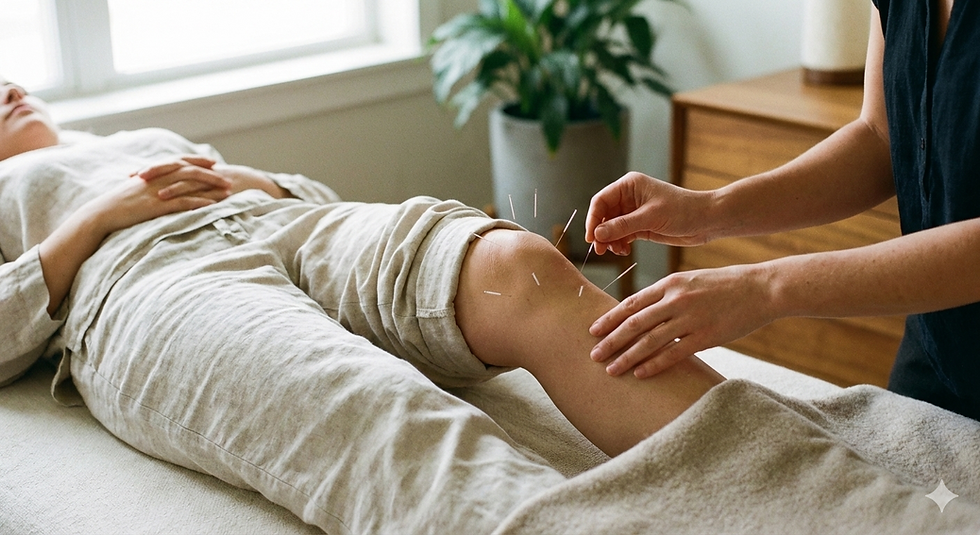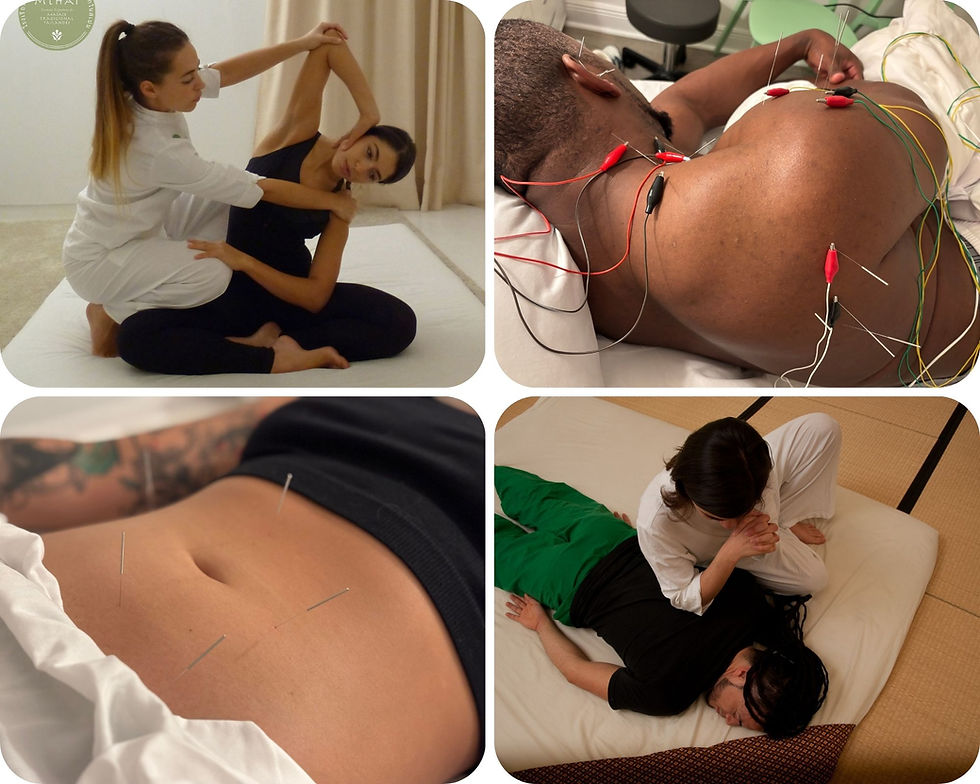Acupuncture for Carpal Tunnel Syndrome: A Natural Path to Hand Relief
- Mar 21, 2024
- 7 min read
Updated: Apr 25, 2025

Around 3-6% of population have Carpal Tunnel Syndrome in US, and the average age is between 40 and 50 years old.
Carpal tunnel syndrome is a condition characterized by pain, numbness, and tingling in the hand and fingers, caused by pressure on the median nerve in the wrist.
Acupuncture can effectively relieve pain and improve hand function.
The needles stimulate the nerves and release natural pain killer chemicals in the body. This encourages blood flow, reduces inflammation, and promotes healing in the affected area.
Acupuncture does not involve the use of drugs like oral steroids or surgical procedures, making it a natural and non-invasive path to hand relief, allowing individuals to avoid potential side effects associated with medications or the risks involved in invasive treatments.
Acupuncture for carpal tunnel syndrome offers an effective alternative that addresses the root cause of the condition rather than just managing symptoms. By restoring the body's natural energy flow, acupuncture seeks to provide long-term relief and improve hand function, enabling individuals to regain their quality of life without relying on invasive interventions or medications.
Why do I have Carpal Tunnel Syndrome?
CTS is a condition that affects the hand and wrist, causing pain, numbness, and tingling sensations. It occurs when the median nerve, which runs from the forearm to the hand, gets compressed or squeezed at the wrist.
Several factors can contribute to the development of CTS:
- Repetitive hand and wrist movements, such as typing, using a computer mouse, or operating machinery, can put excessive strain on the median nerve over time.
- Individuals who have sustained wrist injuries or fractures in the past may be more susceptible to developing CTS.
- Underlying medical conditions, such as arthritis, thyroid disorders, or diabetes, can also increase the risk of developing the syndrome.
- Certain lifestyle factors, including obesity, smoking, and high alcohol consumption, have been linked to an increased likelihood of developing CTS.
Understanding these potential causes is crucial in adopting preventive measures and seeking appropriate treatment for individuals affected by Carpal Tunnel Syndrome.
Diagnosis
To diagnose CTS, medical doctors employ a combination of history, physical examination tests, and nerve conduction studies.
Patient's History:
The medical doctor will ask about the patient's symptoms, including tingling, numbness, weakness, or pain in the hand or fingers. They will also inquire about any relevant risk factors such as repetitive hand movements or previous wrist injuries. Additionally, any associated conditions such as diabetes or thyroid dysfunction will be taken into consideration.

Physical examination:
The doctor will assess for specific clinical symptoms associated with CTS, including Tinel's sign, Phalen's test, or the Durkan test. These tests involve tapping or flexing the wrist to elicit symptoms and provide additional diagnostic information.
Nerve conduction studies:
This test measures the speed and strength of electrical signals as they travel along the median nerve. Typically, a small electric pulse is applied to the nerve, and the response is recorded. Slowed nerve conduction velocities and abnormal signal patterns are indicative of CTS.
In conclusion, the diagnosis of carpal tunnel syndrome involves a combination of history-taking, physical examination tests, and nerve conduction studies. This comprehensive approach allows medical doctors to confirm the presence of CTS and develop an appropriate treatment plan for their patients.
Prognosis:
The prognosis is dependent on various factors.
Patients with moderate carpal tunnel syndrome and no comorbidities will see improvement in symptoms faster, with non-surgical treatment.
If patients with carpal tunnel has other health issues like arthritis, chronic inflammation, etc, first they should treat these triggers before expecting satisfactory clinical outcomes.
The long-term prognosis for mild cases is usually a near-full recovery within the first six months. Patients who have long-standing or severe symptoms may require a longer period of time and may not get back a hundred percent of their function that they had before.
Typical Medical Treatments:

Medical treatments for carpal tunnel syndrome include conservative management and surgical intervention.
Conservative management is often the first line of treatment for mild to moderate cases. This typically involves wearing a wrist splint during activities that exacerbate symptoms, such as typing or gripping objects, to immobilize the wrist and provide support. Nonsteroidal anti-inflammatory drugs (NSAIDs), oral steroids may be prescribed to relieve inflammation and pain. Physical therapy exercises and stretches can also be beneficial in improving muscle strength and flexibility in the hand and wrist.
In more severe cases surgical intervention may be recommended. The most common procedure for carpal tunnel syndrome is called carpal tunnel release surgery. The surgeon cuts the ligament that forms the roof of the carpal tunnel, releasing pressure on the median nerve. This can be done through traditional open surgery or as a minimally invasive endoscopic procedure.
If the patient suffer from certain medical conditions like diabetes or rheumatoid arthritis, the dropout rate will increase considerably.
Treatment of Carpal Tunnel with Chinese Medicine
While conventional Western medicine often treats CTS with pain medications, splinting, or surgery, Traditional Chinese medicine provides an alternative approach to help alleviate the symptoms and address the root causes of this condition.
By incorporating acupuncture, herbal remedies, dietary changes, and lifestyle adjustments, Chinese medicine aims to target the underlying imbalances that contribute to CTS, providing a comprehensive and natural treatment option for those seeking alternatives to traditional approaches.
Acupuncture For Carpal Tunnel:

Acupuncture, a traditional Chinese medicine practice, has gained popularity in recent years for its effectiveness in treating various ailments, including carpal tunnel syndrome.
Acupuncture involves the insertion of thin needles into specific points on the body to stimulate energy flow and restore balance. In the case of carpal tunnel syndrome, acupuncture targets the affected wrist, hand, and arm points to alleviate the symptoms. This technique helps release the pressure on the median nerve, reducing pain and promoting healing.
Usually Carpal Tunnel Syndrome has it root in a nerve damage in the Brachial Plexus in the neck. Chinese medicine always try to find the root of the problem to minimize side effects and to provide the longest possible benefits.
Numerous studies have shown the effectiveness of acupuncture in managing carpal tunnel syndrome. In a randomized, controlled trial, acupuncture was found to be as effective as conventional treatments, such as wrist splints and nonsteroidal anti-inflammatory drugs. Moreover, acupuncture was associated with long-term improvements in symptoms.
Compared to other treatment options, acupuncture is considered safe.
The needles used are extremely thin, minimizing discomfort during insertion. Serious adverse events are rare, with mild bruising or soreness being the most common side effects. Furthermore, acupuncture does not involve the use of medications, reducing the risk of systemic side effects.
Chinese Herbs:

Chinese herbs have been used for centuries in traditional Chinese medicine for their various uses and benefits. Traditional Chinese medicine (TCM) views the body as an interconnected system of energy flow, and Chinese herbs are believed to help restore balance and promote overall well-being.
The therapeutic effects of Chinese herbs can vary depending on the specific herb and its intended use. They can be used to address various health concerns such as digestive issues, respiratory problems, hormonal imbalances, and more.
Chinese herbs play a significant role in traditional Chinese medicine and offer various uses and benefits. Popular herbs like ginseng, astragalus, and goji berries have been used for centuries to support overall health and wellbeing. Whether it is boosting the immune system, improving cognitive function, or promoting longevity, Chinese herbs can offer potential therapeutic effects when used appropriately.
Scientific Validation for Skeptics
Numerous studies, experiments, and research have been conducted to provide credibility and reliability to the claims discussed in the previous sections.
Here we have a short list:
- Acupuncture in treatment of carpal tunnel syndrome: A randomized controlled trial study
- Clinical effectiveness of acupuncture for carpal tunnel syndrome
- Acupuncture for carpal tunnel syndrome: A systematic review and meta-analysis of randomized controlled trials
Why Should I Choose Chinese Medicine?

Traditional Chinese Medicine offers a unique and effective way to address a wide range of health concerns. From chronic pain and digestive issues to mental health and reproductive disorders, TCM takes into account the interconnectedness of the body, mind, and environment. By incorporating various modalities such as acupuncture, herbal medicine, dietary therapy, and Qi Gong, Chinese medicine aims to promote overall well-being and support the body's natural healing abilities.
TCM has less side effects, and in addition to improve your main concern, usually provides a general improvement in the whole organism. Our goal is to improve your metabolism, sleep, energy, digestion, energy, etc.
Natural Healing vs. Symptom Management
Natural healing focuses on promoting the body's ability to heal and recover from the condition, while symptom management aims to alleviate the symptoms associated with CTS without addressing the underlying cause.
Symptom management approach aims to alleviate the symptoms associated with CTS, it can provide temporary relief, they do not necessarily target the root cause of CTS or facilitate long-term healing.
Acupuncture involves the insertion of thin needles into specific points on the body, which helps balance the flow of energy and promote healing.
Several brain areas have been identified to be responsive to acupuncture treatment for carpal tunnel syndrome. These include the primary somatosensory cortex, the supplementary motor area, the anterior cingulate cortex, and the prefrontal cortex. These brain areas play a role in processing sensory information, pain perception, motor control, and cognitive functions. Acupuncture can modulate the activity of these brain areas, leading to pain relief and improved symptoms in individuals with carpal tunnel syndrome.
In conclusion, acupuncture is an effective natural healing method that can alleviate the symptoms of carpal tunnel syndrome by targeting specific acupuncture points and modulating brain areas associated with pain perception and motor control.
Personalized Care vs. One-Size-Fits-All
Personalized care versus a one-size-fits-all approach is a crucial concept in healthcare. The idea behind personalized care is to tailor the treatment approach to the individual's specific needs and characteristics. On the other hand, a one-size-fits-all approach assumes that a single treatment modality can be applied universally without considering individual differences.
Conclusion
Acupuncture has shown promising results as an adjunctive treatment for carpal tunnel syndrome. The studies have indicated that acupuncture can help reduce pain and improve hand function in individuals with this condition.
Patients who have undergone acupuncture treatments have reported a decrease in pain intensity and an increase in hand function. These subjective improvements are encouraging and suggest that acupuncture may be a beneficial adjunctive treatment for carpal tunnel syndrome.
At Soul Acupuncture and Herbal, we offer Traditional Chinese Medicine treatments based on Acupuncture, Chinese Herbal Medicine an Nutritional counseling to promote over all health.
Carpal Tunnel Syndrome is a common issue, Chinese Medicine can offer a painless an efficient approach, it is worth to try it as first treatment option, it can provide wonderful results with no side effects.
*This article is ment to educate and not for diagnosis or treatment, alway contact your primary care provider.




Comments